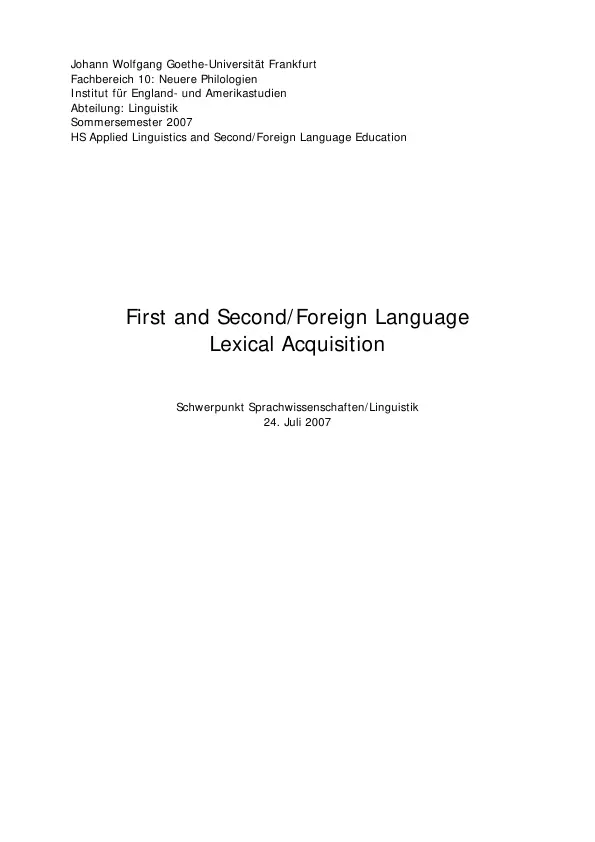1. Introduction
“[T]he major challenge of learning and using a language – whether as L1 or L2 – lies not in the area of broad syntactic prin-ciples but in the ‘nitty-gritty’ of the lexicon.” (Singleton, 1999: 4)
With this statement Singleton asserts that syntax learning is comparatively sim-ple to lexical acquisition. Because “language is largely a matter of words” (Sin-gleton, 1999: 8), words are essential for “linguistic communication” (Singleton, 1999: 9). Therefore, many researches on the mental lexicon of the human first language (L1) have been published, and an increasing number of publications on second and/or foreign language (L2) acquisition – in particular L2 lexical ac-quisition – have raised interest also in this domain.
A crucial basis for research on L2 lexical acquisition is the awareness that the knowledge of at least one language is already present in the situation of acqui-sition. This basis leads to the following questions:
• How does first language lexical acquisition proceed?
• How does L2 lexical acquisition proceed in comparison to L1 lexical proc-esses?
• To what extent are L1 and L2 mental lexicons separated from or inte-grated with each other?
• To what extent are L1 and L2 lexical acquisition connected to the acqui-sition of grammar?
• In what way does lexical processing work and what does it imply for lexi-cal acquisition?
In this paper I do not only want to focus on these questions. Moreover, I want to consider the aspect of Foreign Language Education in terms of lexical acqui-sition. I will conclude my elaborations with regard to the question, what it actu-ally means to know a word.
Nevertheless, I have to define some important terms which I will use frequently throughout the paper. L1 refers to the human mother tongue which is normally acquired during infancy and within the first few years of life. But L1 can also refer to a second bilingually acquired language with a mother-tongue-competence. On the contrary, L2 can refer to any other language which has been acquired after the acquisition of the native language. This does not neces-sarily have to be the second but can also be the fourth or sixth foreign lan-guage one acquires. Whenever I am referring to language learning, I normally mean lexical acquisition in particular, as this is the main focus of this paper. Moreover, I frequently use terms such as ‘word’, ‘lexical unit’, ‘lexical item’ etc., which I do not further differentiate. I use them rather synonymously.
Inhaltsverzeichnis (Table of Contents)
- Introduction
- Several Strategies of Lexical Acquisition
- Fast-mapping
- Whole object assumption
- Mutual exclusivity
- Taxonomic constraints
- L1 Lexical Acquisition
- Lexical Acquisition in infancy
- L1 vocabulary development in the context of the acquisition of literary skills
- L2 Lexical Acquisition
- Naturalistic L2 acquisition
- L2 lexical acquisition in formal instructional settings
- L1 and L2 Lexical Acquisition and Grammar
- L1 and L2 Lexical Acquisition compared
- Similarities
- Differences
- Separation and/or Integration of L1 and L2 in the Mental Lexicon
- Conclusion: What does it mean to know a word?
Zielsetzung und Themenschwerpunkte (Objectives and Key Themes)
This paper aims to explore the complexities of lexical acquisition in both first and second language contexts. It delves into the strategies employed by language learners to acquire new vocabulary and examines the similarities and differences between first and second language lexical acquisition. The paper also investigates the relationship between lexical acquisition and grammatical development, ultimately seeking to answer the question of what it truly means to know a word.
- Strategies of lexical acquisition in L1 and L2
- Comparison of L1 and L2 lexical acquisition processes
- Integration and separation of L1 and L2 mental lexicons
- Relationship between lexical acquisition and grammar acquisition
- The concept of "knowing a word" in language learning
Zusammenfassung der Kapitel (Chapter Summaries)
The introduction sets the stage by highlighting the critical role of lexical acquisition in language learning and the importance of understanding its intricacies. It presents key questions that guide the exploration of both L1 and L2 lexical acquisition processes. The paper then delves into several strategies employed in lexical acquisition, including fast-mapping, the whole object assumption, and mutual exclusivity. The discussion focuses on the application of these strategies in both L1 and L2 acquisition, outlining the potential for conflict and adaptation as language learners progress. The paper then proceeds to examine the acquisition of L1 vocabulary in infancy and its development in the context of literary skills. It further investigates L2 lexical acquisition, exploring both naturalistic and formal instructional settings.
Schlüsselwörter (Keywords)
The key terms and concepts explored in this paper include lexical acquisition, first language (L1), second language (L2), fast-mapping, whole object assumption, mutual exclusivity, mental lexicon, vocabulary development, and language learning.
Frequently Asked Questions
What is the difference between L1 and L2 acquisition?
L1 refers to the native language acquired in infancy, while L2 refers to any language acquired after the native language, often involving different cognitive processes.
What does "fast-mapping" mean in lexical acquisition?
Fast-mapping is a strategy where learners (especially children) quickly associate a new word with a concept after only a single exposure.
Are the mental lexicons of L1 and L2 integrated or separate?
The paper investigates the extent to which the mental storage of words for different languages is connected or functions independently.
How does grammar acquisition relate to vocabulary learning?
The study explores the connection between acquiring words and the structural rules (syntax) of a language, noting that vocabulary is often the core challenge.
What does it actually mean to "know a word"?
Beyond simple translation, knowing a word implies understanding its meaning, usage, grammatical properties, and associations within the mental lexicon.
- Quote paper
- Evelyn Schmitz (Author), 2007, First and second/ foreign Language , Munich, GRIN Verlag, https://www.grin.com/document/87503



